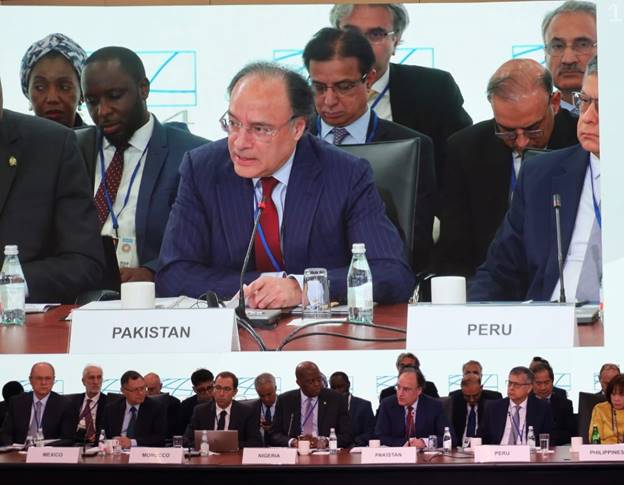

Aurangzeb’s Busy Schedule during IMF Annual Meeting in Washington
By Elaine Pasquini
Washington: Pakistan’s Finance Minister Muhammad Aurangzeb arrived in the United States on October 20, 2024, to attend the annual meetings of the International Monetary Fund (IMF) and World Bank officials at their Washington, DC headquarters.
During his visit, the finance minister briefed Brent Neiman, assistant secretary for International Finance of the US Treasury Department on measures to broaden the tax base, align the provincial AIT regimes with federal personal/corporate income tax rates, rationalize subsidies, reform the energy sector, overhaul state-owned enterprises (SOEs) and build climate resilience through the effective implementation of the climate public investment management assessment (C-PIMA) action plan and enhanced climate adaptation investments. He also thanked the US for its support in securing the IMF’s Extended Fund Facility for Pakistan.
Addressing the Intergovernmental Group of 24 (G-24) meeting of ministers and governors on international monetary affairs and development, Aurangzeb urged all development partners to work closely together to resolve the pressing issues of climate change, population growth and child-stunting faced by developing countries, especially Pakistan.
On becoming the Second Vice Chair of the G-24 Bureau during the fiscal year 2024-25, he emphasized the need to address the issues of high debt burdens on developing countries, the need for climate action and greater representation of developing countries in the IMF and World Bank.
Speaking at the forum “Governor Talks-Pakistan from Stabilization to Sustainable Growth via Structural Reforms” moderated by Jihad Azour, Aurangzeb highlighted policy actions taken by the government to regain economic stability, increase tax revenues, make taxation in Pakistan fairer and more efficient and tackle deep-seated structural distortions to move the country from stabilization to growth.
Participating in the V20 Ministerial Dialogue on the theme “Realizing Climate Prosperity through Financial Reform, Debt Solutions, and Affordable Capital,” Aurangzeb noted that Pakistan was developing its Climate Prosperity Plan. He also emphasized the need to reform global finance to “make debt work for the climate.” He endorsed the official recognition of the V20 by the International Monetary Fund (IMF) as an official intergovernmental group. The minister called upon Multilateral Development Banks (MDBs) to expand grant opportunities and concessional financing windows.
Aurangzeb met with his Saudi counterpart, HE Mohammed Aljadaan, on the sidelines of the World Bank-IMF meetings. Appreciating the historical, fraternal bonds between the Islamic Republic of Pakistan and the Kingdom of Saudi Arabia, the two ministers resolved to further deepen mutually beneficial economic ties, enhance bilateral trade, and facilitate investments in key sectors. The Saudi minister shared his experience of reforms in the energy sector. Both sides agreed to advance cooperation in areas of mutual interest.
In addition, Aurangzeb also held bilateral discussions with the finance ministers from Türkiye, the UK, China and the UAE.
Speaking to the World Bank-IMF Staff Association, Aurangzeb provided an overview of continued stabilization measures undertaken by Pakistan, supported by the IMF Extended Fund Facility. He expressed the resolve to sustain growth by achieving fiscal consolidation, improving the governance and management of state-owned enterprises (SOEs), reducing high-energy costs in the power sector and raising productivity and competitiveness by creating a more favorable private sector business environment.
In a meeting with Makhtar Diop, managing director of the International Finance Corporation (IFC), the two discussed issues relating to the expedited evaluation of bids for the Islamabad airport, Diversified Payment Rights (DPR), raising local currency through offshore bond issuance, privatization of distribution companies (DISCOs) and HBFC, a Pakistani housing building finance company which is a subsidiary of the state bank of Pakistan. The finance minister also extended an invitation to Diop to visit Pakistan.
In a meeting with a delegation from CitiBank led by Jay Collins, Finance Minister Aurangzeb discussed reforms being undertaken in the areas of taxation, energy, seasoned equity offerings, pensions and right-sizing of the government, along with outlining the long-term Road-to-Market strategy. He said that the Pakistani government would explore the option of tapping into international capital markets in due course.
During his visit, the minister also met with officials of international credit rating agencies, commercial banks and investment banks in the Middle East and participated in a roundtable discussion with institutional investors.
The finance minister briefed a team from Deutsche Bank on the state of Pakistan’s economy and expressed satisfaction that the country’s credit ratings had recently been upgraded by Fitch and Moody’s. He also informed the team that a Sustainable Finance Framework was being developed which will enable the country to access green international capital.
(Elaine Pasquini is a freelance journalist. Her reports appear in the Washington Report on Middle East Affairs and Nuze.Ink.)

